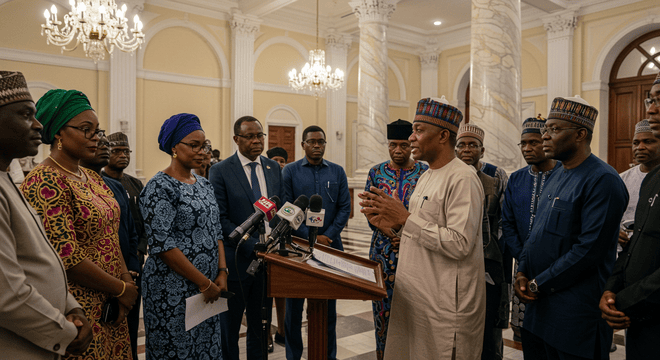
Defections Without Ideology: What the APC Wave Reveals About Nigerian Politics
In recent months, Nigeria has witnessed a fresh and growing wave of defections by prominent political figures into the All Progressives Congress (APC). From state governors and federal lawmakers to grassroots political influencers, the exodus from opposition parties into the ruling APC appears not just widespread but also strategic. While party-switching is not new in Nigeria’s political culture, the sheer frequency and momentum of recent defections have raised important questions about the health of the country’s democracy and the underlying motivations of its political class.
Power, Privilege, and Political Survival
At the heart of most defections lies the pursuit of political survival and access to state power. In Nigeria’s heavily centralized political system, control of the federal government confers enormous influence over security agencies, budget allocations, patronage networks, and appointments. For many politicians, aligning with the ruling party—currently the APC—is a calculated move to remain relevant, avoid political isolation, and secure their personal and political interests.
The APC’s dominance in the National Assembly and its control of key states make it a magnet for those who view political affiliation primarily as a means of survival rather than ideological alignment. Being in opposition, particularly in a state controlled by the APC, often translates to limited access to state resources, marginalization in federal allocations, and a more challenging electoral path.
A Democracy without Ideology
A major driver of defections is the lack of ideological depth in Nigeria’s political party system. The lines separating the APC, the Peoples Democratic Party (PDP), the Labour Party, and other political entities are often blurred. Beyond campaign slogans and election manifestos, most parties do not offer distinct philosophies or long-term policy visions.
This absence of ideological grounding enables a fluid and often opportunistic movement of politicians across party lines. For many, a political party is merely a platform to achieve electoral success. Loyalty to principles takes a back seat when opportunities for appointments, contracts, or political protection are perceived to be greater in another party.
Pre-2027 Positioning
Another strong undercurrent driving the defections is the anticipation of the 2027 general elections. Politicians are already aligning themselves for future contests—whether for the presidency, governorships, Senate seats, or local government leadership. The APC, being the ruling party, is viewed by many as the most strategic base from which to launch such ambitions.
By joining the APC now, defectors hope to build early alliances, curry favor with the party hierarchy, and increase their chances of being selected as candidates during primaries. For those who lost out in previous elections, it is also a means to reinvent themselves and return to public office through a potentially more favorable platform.
Collapse of Internal Democracy in Opposition Parties
The implosion of internal democracy within opposition parties has also driven many into the arms of the APC. The PDP, once Nigeria’s dominant political party, has been racked by internal disputes, leadership tussles, and factionalism. The Labour Party, despite its recent electoral resurgence, has struggled with credibility, structural cohesion, and coordinated opposition.
When internal crises become irreconcilable, defection becomes a practical, if cynical, escape route. Rather than stay to reform their parties, many politicians prefer to abandon ship and join the more cohesive APC machinery.
Defection as a Legal and Ethical Loophole
In theory, Nigeria’s Constitution provides some checks against defections, especially for lawmakers who switch parties without a justifiable cause. However, in practice, enforcement is lax, and defectors frequently cite “division” within their parties as a legal cover. This loophole, combined with the reluctance of party leaders to challenge powerful defectors, has effectively normalized defection as an accepted part of the political process.
The EFCC and the Politics of Prosecution
There is also a more controversial angle: defection as a shield from prosecution. Critics have pointed to a pattern where politicians under investigation by the Economic and Financial Crimes Commission (EFCC) suddenly find refuge in the APC—and, curiously, face reduced scrutiny thereafter. While the APC has denied using its platform as a sanctuary for the corrupt, the optics have not been favorable.
The perception that joining the ruling party provides a form of immunity—whether real or imagined—undermines public trust in the justice system and fuels the belief that the fight against corruption is selective and politicized.
A Troubling Trend for Democracy
Ultimately, the wave of defections to the APC is a symptom of deeper issues within Nigeria’s democratic experiment. The absence of strong institutions, the dominance of political godfathers, the fragility of party structures, and the overwhelming focus on personal gain over public service have all combined to produce a political culture where loyalty is fleeting and principles are expendable.
While the APC may celebrate these defections as signs of strength and popularity, the broader implication is a weakening of opposition, reduced political competition, and the erosion of accountability. Democracy thrives on the presence of vibrant, principled alternatives—not a revolving door of opportunism.
Conclusion
Until Nigeria’s political parties evolve into truly ideological, policy-driven entities with internal democracy and accountability, defections will remain a recurring feature of its political landscape. And as long as power remains centralized and transactional, politicians will continue to treat party membership as a tool for advancement, not a commitment to serve.
The challenge now is for citizens, civil society, and reform-minded leaders to demand better: parties that stand for something, and politicians who stay for something.


